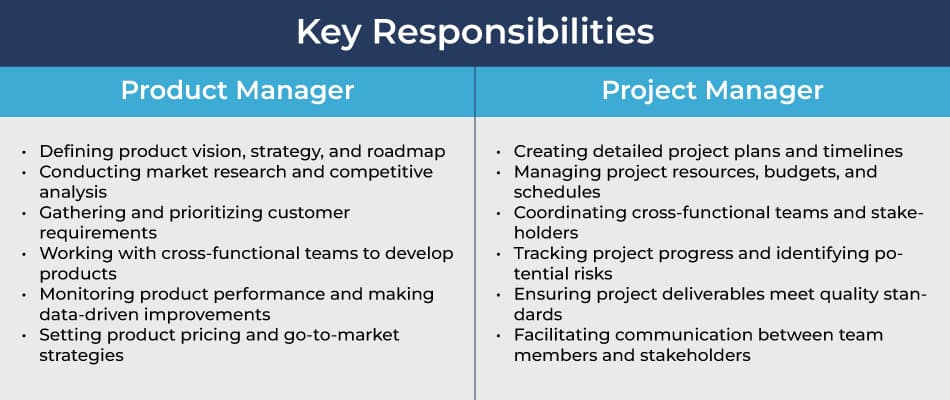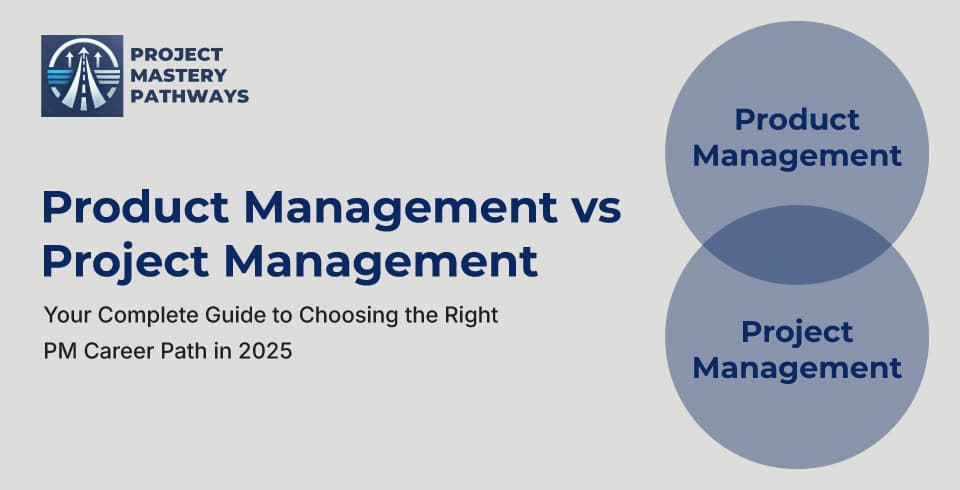Are you confused about whether to pursue a career in product management or project management? Do you find yourself wondering why both roles are called “PM” when they seem to involve completely different responsibilities? You’re not alone – even industry veterans often get these roles mixed up, despite their fundamental differences in focus, skills, and career trajectories.
If you’re an aspiring project manager trying to understand these distinctions or considering a potential career shift, this guide will clarify everything you need to know. By the end of this blog, you’ll understand the key differences between product and project management, identify which path aligns with your skills and interests, and make an informed decision about your professional future.
Understanding the Fundamental Difference: Products vs Projects
Before diving into the roles themselves, it’s crucial to understand what distinguishes a product from a project, as this forms the foundation of each management discipline.
A product is a good that satisfies the needs of a particular group, also known as a target market. A product can be anything from software to jewelry, or even a service such as consulting. Each product goes through the product lifecycle, from development to market testing and, ultimately, release.
A project, on the other hand, is a collection of tasks to accomplish a specific goal. Projects should have outcomes and deliverables, which can be anything from a website revamp to a new internal process.
The key distinction lies in their timeline and evolution. Projects are time-bound, with a fixed scope, timeline, and budget, aiming to deliver a specific outcome. In contrast, products are goods or services developed to satisfy the needs of a group of users. Unlike projects, products are not temporary endeavors – they evolve and adapt to current user needs to prove their utility and avoid being retired.
For example, building a new smartphone model is a project with a set timeline, budget, and specific features to deliver. However, the smartphone itself is a product that continues to evolve through software updates, feature enhancements, and user feedback long after its initial launch.
To understand more about project fundamentals and effective planning strategies, explore How to Design Project Planning Templates: A Comprehensive Guide for Aspiring Project Managers in 2025.
Core Responsibilities: What Each Role Actually Does
Product Manager: The Strategic Visionary
A product manager is someone who identifies the what and why of a product. They are responsible for ensuring that all new products or features will fulfill customer needs and business objectives. Product managers are often considered the “CEO of the product” and focus on strategic decision-making that drives product success throughout its entire lifecycle.
Key responsibilities include:
- Defining product vision, strategy, and roadmap
- Conducting market research and competitive analysis
- Gathering and prioritizing customer requirements
- Working with cross-functional teams to develop products
- Monitoring product performance and making data-driven improvements
- Setting product pricing and go-to-market strategies

Project Manager: The Execution Expert
A project manager, on the other hand, is someone who focuses on the how and when of a project by coordinating, managing, and overseeing projects. Project managers are the planners and executors who ensure that projects are delivered on time, within scope, and on budget.
Key responsibilities include:
- Creating detailed project plans and timelines
- Managing project resources, budgets, and schedules
- Coordinating cross-functional teams and stakeholders
- Tracking project progress and identifying potential risks
- Ensuring project deliverables meet quality standards
- Facilitating communication between team members and stakeholders
For more insights on managing different types of projects effectively, check out Examples of Waterfall Type Projects in Project Management.
Skills and Qualifications: What You Need to Succeed
While both roles require strong leadership and communication skills, they demand different core competencies and backgrounds.
Product Management Skills:
- Strategic Thinking: Understanding market dynamics, customer needs, and business objectives to create winning product strategies
- Customer-Centric Mindset: Ability to empathize with users and translate their needs into product features
- Business Acumen: Understanding of financial metrics, market positioning, and competitive landscapes
- Analytical Skills: Proficiency in data analysis, market research, and performance measurement
- Technical Understanding: Basic knowledge of development processes and technical constraints
Project Management Skills:
- Process Management: Expertise in project methodologies like Agile, Waterfall, or hybrid approaches
- Resource Planning: Ability to allocate time, budget, and human resources effectively
- Risk Management: Skills in identifying, assessing, and mitigating project risks
- Stakeholder Management: Coordinating diverse teams and managing expectations across the organization
- Quality Control: Ensuring deliverables meet specified standards and requirements
Our research reveals that 79% of product managers had some experience in project management and 92% agreed that project management skills were useful in their profession. This demonstrates the significant overlap in foundational skills, making transitions between these roles quite feasible.
Career Paths and Compensation: What to Expect
Product Management Career Trajectory: Career progression typically follows a path from associate product manager to product manager, then to senior product manager and leadership roles like director of product or chief product officer. Product managers often start with backgrounds in marketing, design, engineering, or business operations.
Project Management Career Trajectory: Project managers usually begin in roles like project coordinator or assistant, building expertise through hands-on experience. They can advance to senior project manager, program manager, or portfolio manager positions. Many project managers also transition into product management roles as they develop strategic thinking skills.
Compensation Comparison: The average salary for product managers is $122,471 per year. This figure can vary depending on factors such as company size, industry, level of responsibility and individual experience. In comparison, project managers earn an average salary of $92,561 per year.
The salary difference reflects the strategic nature of product management roles and their direct impact on business outcomes. However, both careers offer strong growth potential and job security across multiple industries.
For aspiring professionals looking to enhance their credentials, understanding Which Certification is the Best for Project Management Career can provide valuable guidance on professional development opportunities.
How Product and Project Managers Collaborate for Success
Product Managers and Project Managers are like two sides of the same coin — they work together to bring great products to life. Product managers shape the vision and strategy, while project managers ensure that the vision gets executed efficiently.
In practice, successful organizations recognize that these roles complement each other perfectly. Product managers define what needs to be built and why, while project managers determine how to build it efficiently and when it will be completed. This collaboration is essential for delivering successful products that meet both customer needs and business objectives.
When asked which role their skills were most closely aligned with, product managers most commonly chose project management (54%) and vice versa (36%). This mutual alignment demonstrates the natural synergies between these disciplines.
Ready to accelerate your project management career and build the skills that both product and project managers value? Subscribe to PMPwithRay for expert insights, career guidance, and practical tips that will help you excel in either path.
Whether you choose product management or project management, developing strong foundational skills is essential for long-term success. Enroll in comprehensive project management courses on Udemy to build the execution expertise that serves as a solid foundation for either career path. These courses provide the practical knowledge and certification preparation you need to launch or advance your PM career with confidence.
Your future in project or product management starts with understanding these fundamental differences and building the right skill set. Choose the path that aligns with your strengths and interests – both offer exciting opportunities for growth and impact in today’s dynamic business environment.

